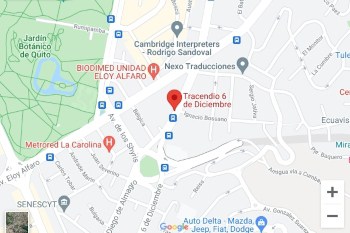Notarized Translations in Quito: A Quick Guide
Notarizations play an essential role in legal and commercial transactions worldwide. They provide a necessary level of authentication and legitimacy to documents. In Quito, it’s crucial to know where and how to obtain a notarial certification, who can do it, and what legal value it holds. In the case of documents originally written in a different language, meeting the requirements for notarized translations is necessary.
Where to Notarize a Translation in Quito?
Public Notaries: These are the primary places where notarized documents are traditionally obtained. These offices are scattered throughout the city and are easily accessible. In Ecuador, public notaries are authorized by the government and are responsible for verifying the authenticity of signatures and the content of documents. To obtain a notarial certification at one of these offices, you should:
- Locate a nearby notary. They are often in commercial areas or near government buildings.
- Bring the relevant document with its respective translation and a valid identification document (e.g., ID card or passport).
- Have the translator’s signature acknowledged. For translated documents, it is essential that the translator acknowledges their signature in front of the notary. To do this, the professional who translated the document should present their enabling certification and identification to support it.
- Provide any other required documentation or information for the procedure.
- Pay the notary fees (which can vary depending on the complexity of the document and individual rates).
Legal Firms and Attorneys: Legal firms and practicing attorneys often offer notarization services as part of their legal practice. If you have a legal matter that requires notarization, consider consulting with a lawyer or legal firm in Quito. They can guide you through the process and ensure that your documents are properly notarized.
Who Performs Notarizations in Quito?
In Quito, notarizations are usually performed by public notaries authorized by the government. These notaries are trained and authorized to perform a wide range of notarial acts, such as verifying signatures, certifying document copies, and attesting to affidavits and contracts. Public notaries in Ecuador are public officials who hold positions of trust and responsibility.
A public notary is often a lawyer or legal professional who has completed the required training and passed the necessary exams to obtain a notary public license. They ensure the legality and authenticity of the documents they notarize. This includes verifying the identity of the parties involved, confirming their intent, and ensuring that the document complies with relevant laws and regulations.
Public notaries in Quito are impartial; they are not aligned with any of the parties in a transaction. Their role is to provide an objective and impartial evaluation of the document and its signatories. They also maintain a record of notarized documents, which can be critical for future legal references or disputes.
Legal Value of Notarizations in Quito
Notarizations in Quito hold significant legal value and are widely recognized as proof of the authenticity and validity of a document. Here are some key aspects of their legal significance:
Authentication and Identity Verification: Public notaries in Quito are responsible for verifying the identity of the parties involved in a transaction. This verification helps prevent fraud and ensures that the individuals signing the document are who they claim to be.
Legitimacy of the Document: When a document is notarized, it gains a level of legitimacy that can be crucial in legal proceedings. Courts and public agencies consider notarized documents to be more reliable.
Public Record: Public notaries maintain records of notarized documents, creating a public record of transactions. This can be essential for establishing a clear history of legal and financial matters.
International Recognition: Notarizations conducted in Quito are often internationally recognized, making them suitable for documents intended for use outside of Ecuador. This can include contracts, powers of attorney, and other legal instruments.
Dispute Prevention: Notarial documents can help prevent disputes and misunderstandings by providing a clear record of the agreement or transaction. In case of litigation, a notarized document can serve as strong evidence in court.
Notarizations are a fundamental part of legal and financial transactions in Quito, Ecuador. The same concept applies to notarized translations. If you require this type of service, Tracendio can assist you with your notarized translations and provide home delivery if necessary.





Leave a Reply